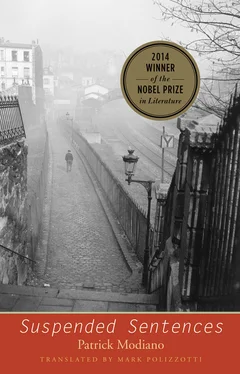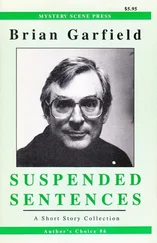When I got out of school, my brother was waiting for me all alone.
“There’s nobody home at our house.”
He told me the housekeeper had brought him back to the house a little while ago. Annie’s 4CV was there, but no one was home. The housekeeper had to go do the shopping in Versailles until late that afternoon and she had left my brother at the house, telling him that Annie would be back soon since her car was there. My brother had sat in the empty house, waiting.
He looked happy to see me. He even laughed, like someone who had been afraid but was now relieved.
“They just went to Paris,” I reassured him. “Don’t you worry.”
We walked up Rue du Docteur-Dordaine. Annie’s 4CV was there.
Nobody in the dining room or the kitchen. Or the living room. Upstairs, Annie’s room was empty. Little Hélène’s as well. So was Mathilde’s, in the back of the courtyard. We went into Snow White’s room: maybe she had come back after all. But no. It was as if no one had ever lived in those rooms. Through the window of our bedroom, I stared down at Annie’s 4CV.
The silence in the house was frightening. I turned on the radio and we ate the two apples and two bananas that remained in the fruit basket, on the sideboard. I opened the back door. The green bumper car was still there, in the middle of the courtyard.
“We’ll wait for them,” I said to my brother.
Time passed. The hands on the kitchen clock said twenty minutes to two. It was time to go back to school. But I couldn’t leave my brother all alone. We sat down, facing each other, at the dining room table. We listened to the radio.
We went outside. Annie’s 4CV was still there. I opened one of the doors and sat in the front seat, in my usual spot. I rifled through the glove compartment and carefully inspected the back seat. Nothing. Except an empty cigarette pack.
“Let’s walk up to the chateau,” I said to my brother.
The wind was blowing. We walked along Rue du Docteur-Dordaine. My friends were already back in school, and the teacher would have noticed my absence. The more we walked, the deeper the silence grew around us. Beneath the sun, that street and all its houses seemed deserted.
The wind gently ruffled the tall grass in the meadow. The two of us had never ventured here alone. The boarded-up windows of the chateau provoked the same anxiety in me as in the evenings, coming back from our walks in the woods with Snow White. The chateau façade was dark and threatening in those moments. As it was now, in midafternoon.
We sat down on the bench, where Snow White and Little Hélène used to sit back when we climbed the branches of the pine trees. The silence still hovered around us, and I tried to play a tune on the harmonica Annie had given me.
On Rue du Docteur-Dordaine, we saw, from afar, a black car parked in front of the house. A man was at the wheel, his leg sticking out from the open driver’s-side door, and he was reading the newspaper. At the door to the house, a gendarme in uniform stood very stiff, with a bare head. He was young, with short-cropped blond hair, and his big blue eyes stared into the void.
He started and looked at my brother and me, his eyes wide.
“What are you doing here?”
“This is my house,” I said. “Has something happened?”
“Something very serious.”
I felt afraid. But his voice was trembling a bit as well. A truck with a crane turned the corner of the avenue. A bunch of gendarmes hopped out and attached Annie’s 4CV to the crane. Then the truck started up again, slowly towing Annie’s 4CV behind it down Rue du Docteur-Dordaine. That was the part that hit me hardest and made me feel the worst.
“It’s very serious,” he said. “You can’t go in.”
But we did go in. Someone was on the phone in the living room. A dark-haired man in a gabardine coat was sitting on the edge of the dining room table. He saw my brother and me and came toward us.
“Ah … Are you them? … The children …?”
He repeated:
“Are you the children?”
He pulled us into the living room. The man on the phone hung up. He was short with very wide shoulders, and he wore a black leather jacket. He said, like the other one:
“Ah … It’s the children.”
He said to the man in the gabardine coat:
“You’ll have to take them to headquarters in Versailles. Nobody’s answering in Paris …”
Something very serious, the gendarme with the big blue eyes had said. I remembered the newspaper clipping that Little Hélène kept in her wallet: TRAPEZE ARTIST HÉLÈNE TOCH IN SERIOUS ACCIDENT. I kept behind her to watch her walk. She hadn’t always had that limp.
“Where are your parents?” the dark-haired man in the gabardine coat asked me.
I tried to find an answer. It was too complicated to explain. Annie had said so, the day when we’d gone together to see the principal of the Jeanne d’Arc school and she’d pretended to be my mother.
“Don’t you know where your parents are?”
My mother was acting in her play somewhere in North Africa. My father was in Brazzaville or Bangui, or somewhere farther still. It was too complicated.
“They’re dead,” I told him.
He flinched. He looked at me, knitting his brow. It was as if he was suddenly afraid of me. The short man in the leather jacket stared at me as well, with worried eyes, his lips parted. Two gendarmes entered the living room.
“Should we keep searching the house?” one of them asked the dark-haired man in the gabardine coat.
“Yes, yes … Keep searching …”
They left. The dark-haired man in the gabardine coat leaned toward us.
“Go play in the garden,” he said in a very gentle voice. “I’ll come see you in a little bit.”
He took each of us by the hand and led us outside. The green bumper car was still there. He stretched out his arm toward the garden:
“Go play … I’ll see you in a little bit.”
And he went back inside the house.
We climbed the stone steps to the first terrace of the garden, where the grave of Doctor Guillotin was hidden under the clematis and Mathilde had planted a rose bush. The window to Annie’s room was wide open, and since we were level with that window, I could see that they were searching everything in Annie’s room.
Lower down, the short man in the black leather jacket was crossing the courtyard, holding a flashlight. He leaned over the edge of the well, pushed aside the honeysuckle and strained to see something down at the bottom, with his flashlight. The others continued rummaging through Annie’s room. Still others arrived, gendarmes and men wearing everyday clothes. They searched everywhere, even inside our bumper car; they walked around the courtyard, appeared in the windows of the house, and called to each other in loud voices. And my brother and I, we pretended to play in the garden, waiting for someone to come collect us.
For Zina
For Marie
For Douglas
A chatty old woman
A rider in gray
An ass that is watching
A rope fall away
Some lilies and roses
In an old mustard pot
On the highway to Paris
These things you will spot.
— Lamartine
That Sunday evening in November, I was on Rue de l’Abbé-de-l’Epée. I was skirting the high wall around the Institut des Sourds-Muets. To the left rises the bell tower of the church of Saint-Jacques-du-Haut-Pas. I could still recall a café at the corner of Rue Saint-Jacques, where I used to go after taking in a film at the Studio des Ursulines.
On the sidewalk, dead leaves. Or burned pages from an old Gaffiot dictionary. It’s the neighborhood of colleges and convents. My memory dredged up a few outdated names: Estrapade, Contrescarpe, Tournefort, Pot-de-Fer … I felt apprehensive crossing through places where I hadn’t set foot since I was eighteen, when I attended a lycée on the Montagne-Sainte-Geneviève.
Читать дальше












